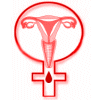I was quite excited to see our own Chris Bobel and Giovanna Chesler quoted in this piece from The Guardian about menstrual activism, and then to discover that the Guardian published a second piece the same day about menstruation: Rowena Davis explains What My Period Means to Me. Kira Cochrane’s article about menstrual activism provides a broad, useful definition of the term, and several examples, ranging from avant-garde artworks to Rachel Kauder Nalebuff’s collection of menarche stories to Chris’ forthcoming book about third-wave feminist activism and menstruation.
It seems that menstrual activism (otherwise known as radical menstruation, menstrual anarchy, or menarchy) is having a moment. The term is used to describe a whole range of actions, not all considered political by the person involved: simple efforts to speak openly about periods, radical affronts to negative attitudes and campaigns for more environmentally friendly sanitary products.
Davis’ essay is a personal one, describing the transformation of her negative attitude toward her own period to one of not only acceptance but appreciation of menstruation for the opportunity it provides to reflect:
[T]hese days I can’t wait for the next one – really! Like the women in The Red Tent, I use it as a time to slow down, rest and check in with myself. ‘What’s happened in this last chapter of my life?’ I ask myself. ‘What is my body telling me?’ If I’ve had a bad month where I’ve been suppressing tension or working too hard, my period is much heavier and more painful. It’s a sign that I haven’t been listening to my needs.
My enjoyment of these articles was marred, however, by reading the comments from Guardian readers. The vitriol is staggering. There are offensive remarks equating menstruation with elimination and menstrual blood with feces, admonishments to women to keep silent about their periods, criticism of the Guardian for publishing such “twaddle”, and rebukes to feminists for concerning themselves with something as trivial as women’s bodies. I think it’s that last one that disturbs me the most; modern feminism owes a great deal to the second-wave concept that the personal is political. As we have documented elsewhere in re: Cycling and the work of the Society for Menstrual Cycle Research, it is not menstruation that oppresses women. But attitudes toward women and menstruation and the communication and silences regarding menstruation can be oppressive. To draw upon one of my favorite theorists, Simone de Beauvoir, menstruation does not make women the Other; it is because she is Other that menstruation is a curse.
Just as the penis derives its privileged evaluation from the social context, so it is the social context that makes menstruation a curse. The one symbolizes manhood, the other femininity; and it is because femininity signifies alterity and inferiority that its manifestation is met with shame. (The Second Sex, p. 354)
Menstrual activist Chella Quint told Cochrane says that she plans to continue writing “Adventures in Menstruating” until it is time for Adventures in Menopausing instead, “but, of course, it would be great if I didn’t have to, if there was no shame whatsoever”.
Likewise, the Society for Menstrual Cycle Research will continue our work until it’s no longer necessary.



I was intrigued by a comment which stated that the only women who write articles like the above are women who have “easy” periods (i.e., not very heavy or painful). It made me wonder, is it an easy period which makes the attitude or the attitude that makes the period easy?
@Jamie: Having had excruciatingly painful periods myself, and heavy bleeding to the point of anemia, I can pretty much say that my “attitude” wasn’t the problem.
@Sophie: My thinking doesn’t apply to you then does it?
Nowhere did I say that attitude makes a period not “easy”. Thanks for your pointless anecdote.
Hi there,
I had a strange collective consciousness moment over that Guardian article, I had been reading Karen Houppert’s The Curse and written a post about menstruation and the pill for my blog the night before it was published:
https://www.sweeteningthepill.blogspot.com/
Holly
I’d like to respond to both Jamie and Sophie. There is loads of research in both medicine and psychology that shows a relationship between a positive attitude and faster, easier, recovery from surgery or illness. I was hoping one of my colleagues with expertise in this area would respond about similar research regarding menstruation, as I’d have to do some library searching to answer definitively. Certainly a positive attitude toward menstruation can make menstrual discomforts easier to cope with, even though, as Sophie notes, it’s not likely to change one’s physiology.
Also, I must (gently) chide Jamie for her third comment here: Sophie’s anecdote isn’t pointless. As qualitative researchers sometimes joke, the plural of ‘anecdote’ is ‘data’. If it weren’t for women willing to tell us about their menstrual experiences, we wouldn’t know anything about their attitudes or their pain.
My point is that it’s a small step from saying “a positive attitude helps people who are sick get better” to “if you’re sick, it must be because your attitude isn’t positive enough.” And then we start blaming people for their own illnesses. Why don’t you just think yourself better? Come on, everyone else can do it!